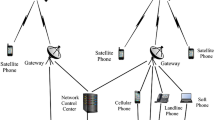Abstract
Low-Earth orbit satellite networks have received attention from academia and industry for their advantages in terms of wide coverage and low latency. Meantime deep learning can provide more accurate traffic anomaly detection and has become an important class of methods for LEO satellite network security. However, deep learning is susceptible to adversarial sample attacks, and the LEO satellite network system has not been investigated to find a framework for adversarial sample attacks and defence systems, which poses a potential risk to network communication security. In this paper, we design a framework to generate and defend against adversarial samples in real time. By capturing traffic from LEO satellites, it can generate traffic adversarial samples to detect whether malicious traffic classification models are vulnerable to attacks, and defense against adversarial sample attacks in real time. In this paper, a simple LEO satellite simulation platform is built to generate traffic adversarial samples using four classical adversarial sample generation methods, and a two-classification deep learning model is trained to determine the effectiveness of the attack and defence. Experiments show that the framework proposed in the paper can crawl traffic and perform self-attack and defence tests.
Support by the Key Research and Development Program of Guangzhou (No. 202103050003).
Access this chapter
Tax calculation will be finalised at checkout
Purchases are for personal use only
Similar content being viewed by others
References
RAKS: robust authentication and key agreement scheme for satellite infrastructure \(|\) SpringerLink. https://link.springer.com/article/10.1007/s11235-022-00923-0#citeas
Darwish, T., Kurt, G.K., Yanikomeroglu, H., Lamontagne, G., Bellemare, M.: Location management in internet protocol-based future Leo satellite networks: a review. IEEE Open J. Commun. Soc. 3, 1035–1062 (2022). https://doi.org/10.1109/OJCOMS.2022.3185097
Dong, Y., et al.: Boosting adversarial attacks with momentum (2017). https://doi.org/10.48550/ARXIV.1710.06081, https://arxiv.org/abs/1710.06081
Fahrnberger, G.: Realtime risk monitoring of SSH brute force attacks. In: Phillipson, F., Eichler, G., Erfurth, C., Fahrnberger, G. (eds.) I4CS 2022. CCIS, vol. 1585, pp. 75–95. Springer, Cham (2022). https://doi.org/10.1007/978-3-031-06668-9_8
Fung, T.Y., Roy, S.S., Shi, Q., DeLaurentis, D.A.: Space junk aggregation, neutralization, in-situ transformation, and orbital recycling. In: 2022 17th Annual System of Systems Engineering Conference (SOSE), pp. 239–245 (2022). https://doi.org/10.1109/SOSE55472.2022.9812659
Gao, J., Senchun, C., Zhang, B., Xia, Y.: Research on network intrusion detection based on incremental extreme learning machine and adaptive principal component analysis. Energies (2019)
Goodfellow, I.J., Shlens, J., Szegedy, C.: Explaining and harnessing adversarial examples (2014). https://doi.org/10.48550/ARXIV.1412.6572, https://arxiv.org/abs/1412.6572
He, K., Zhang, X., Ren, S., Sun, J.: Deep residual learning for image recognition. In: Proceedings of the IEEE Conference on Computer Vision and Pattern Recognition, pp. 770–778 (2016)
Huizinga, T.: Using machine learning in network traffic analysis for penetration testing auditability (2019)
Mohmand, M.I., et al.: A machine learning-based classification and prediction technique for DDoS attacks. IEEE Access 10, 21443–21454 (2022). https://doi.org/10.1109/ACCESS.2022.3152577
Kurakin, A., Goodfellow, I., Bengio, S.: Adversarial examples in the physical world (2016). https://doi.org/10.48550/ARXIV.1607.02533, https://arxiv.org/abs/1607.02533
Lopez-Martin, M., Carro, B., Sánchez-Esguevillas, A., Lloret, J.: Network traffic classifier with convolutional and recurrent neural networks for internet of things. IEEE Access (2017)
Madry, A., Makelov, A., Schmidt, L., Tsipras, D., Vladu, A.: Towards deep learning models resistant to adversarial attacks (2017). https://doi.org/10.48550/ARXIV.1706.06083, https://arxiv.org/abs/1706.06083
Puddu, R., Popescu, V., Murroni, M.: An open source satellite network simulator for quality based multimedia broadband traffic management. In: 2022 IEEE International Symposium on Broadband Multimedia Systems and Broadcasting (BMSB), pp. 01–07 (2022). https://doi.org/10.1109/BMSB55706.2022.9828566
Shafiq, M., Yu, X.: Effective packet number for 5g im WeChat application at early stage traffic classification. Mob. Inf. Syst. (2017)
Singh, S., Purbey, S.: Space debris - it’s effect on the earth. Int. J. Recent Adv. Multidiscipl. Top. 3(6), 13–16 (2022). https://www.journals.resaim.com/ijramt/article/view/2135
Tang, Q., Fei, Z., Li, B., Han, Z.: Computation offloading in Leo satellite networks with hybrid cloud and edge computing. IEEE Internet Things J. 8(11), 9164–9176 (2021). https://doi.org/10.1109/JIOT.2021.3056569
Tundis, A., Mazurczyk, W., Mühlhäuser, M.: A review of network vulnerabilities scanning tools: types, capabilities and functioning. In: Proceedings of the 13th International Conference on Availability, Reliability and Security. ARES 2018. Association for Computing Machinery, New York (2018). https://doi.org/10.1145/3230833.3233287
Vykopal, J., Drašar, M., Winter, P.: Flow-based brute-force attack detection. Department of Mathematics & Computer Science (2013)
Wang, W., Zhu, M., Zeng, X., Ye, X., Sheng, Y.: Malware traffic classification using convolutional neural network for representation learning. In: International Conference on Information Networking (2017)
Wang, X., Liu, Y., Su, W.: Real-time classification method of network traffic based on parallelized CNN. In: 2019 IEEE International Conference on Power, Intelligent Computing and Systems (ICPICS) (2019)
Zargar, S.T., Joshi, J., Tipper, D.: A survey of defense mechanisms against distributed denial of service (DDoa) flooding attacks. IEEE Commun. Surv. Tutor. 15(4), 2046–2069 (2013). https://doi.org/10.1109/SURV.2013.031413.00127
Author information
Authors and Affiliations
Corresponding author
Editor information
Editors and Affiliations
Rights and permissions
Copyright information
© 2022 The Author(s), under exclusive license to Springer Nature Switzerland AG
About this paper
Cite this paper
Li, Y. et al. (2022). Network Intrusion Detection Adversarial Attacks for LEO Constellation Networks Based on Deep Learning. In: Yuan, X., Bai, G., Alcaraz, C., Majumdar, S. (eds) Network and System Security. NSS 2022. Lecture Notes in Computer Science, vol 13787. Springer, Cham. https://doi.org/10.1007/978-3-031-23020-2_3
Download citation
DOI: https://doi.org/10.1007/978-3-031-23020-2_3
Published:
Publisher Name: Springer, Cham
Print ISBN: 978-3-031-23019-6
Online ISBN: 978-3-031-23020-2
eBook Packages: Computer ScienceComputer Science (R0)




